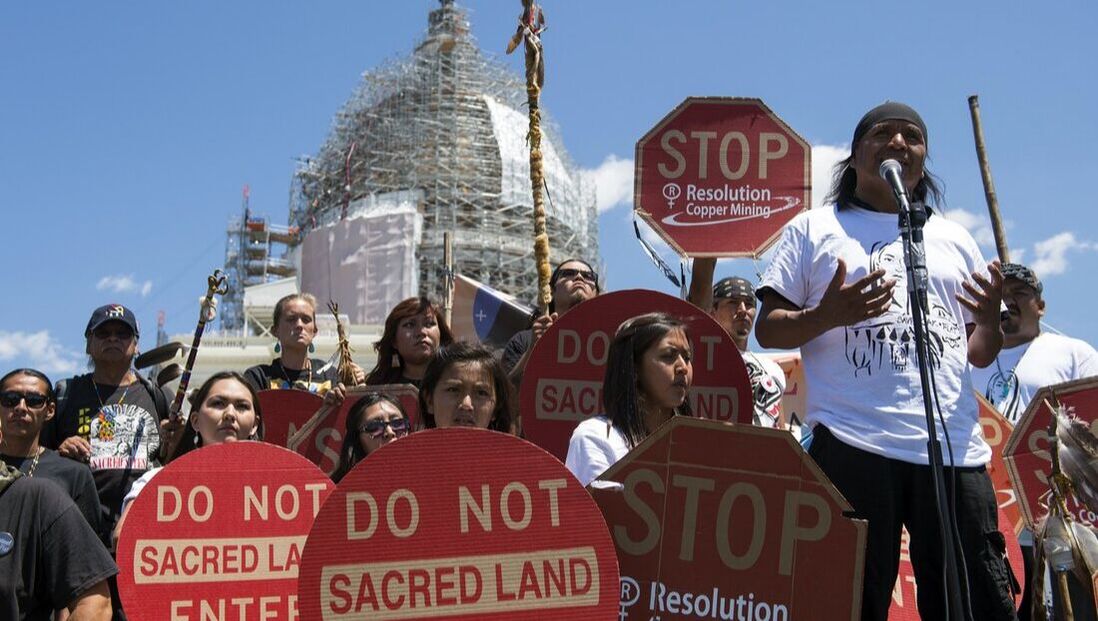|
Protect The 1st filed an amicus brief today before the federal Ninth Circuit Court of Appeals on behalf of Apache tribes seeking to stop a land swap that would allow Resolution Copper, a foreign mining group, to destroy sacred tribal lands.
The Apache are appealing a ruling by the U.S. District Court for Arizona that found that the land swap, which would allow mining companies to transform sacred Apache lands into a two-mile-wide sinkhole, would not – somehow – amount to a substantial burden of the Apache’s free exercise of religion. Joining with the Jewish Coalition for Religious Liberty, the International Society for Krishna Consciousness, The Church of Jesus Christ of Latter-Day Saints, and the Sikh Coalition, Protect The 1st wrote that the district court misinterpreted the Religious Freedom Restoration Act (RFRA), as well as a precedent, Navajo Nation v. U.S. Forest Serv. “While, on its surface, this case concerns Native American religious rights,” the amici declared, “the district court’s erroneously narrow standard for what qualifies as a substantial burden under RFRA will harm Jewish, Muslim, Sikh, Buddhist, Hare Krishna, Christian and all manner of religious communities, organizations and individuals.” The district court’s findings of fact for the Apache run directly against the court’s ruling. That court recognized that:
Thus, the court ruled that the destruction of a sacred religious site – held in trust by the U.S. government for the Apaches since 1852 – would have a devastating effect on the Apache people’s religious practices … without burdening their exercise of religion. The brief noted that if upheld, this ruling will have a general applicability: “At least the district court’s parsimonious view of substantial burdens does not discriminate among faiths—all will suffer.” The brief assailed the logic of the district court, which did not count the annihilation of Apache sacred land as a “substantial burden” because the government had neither denied a government benefit to nor imposed civil or criminal penalties upon the Apache. In response, the amici write that “the district court ignored that there are other ways, including the governmental plan to have Oak Flat mined into destruction, for religious exercise to be thus burdened.” The brief quotes then-Judge (now Justice) Neil Gorsuch: Whenever the government “prevents the plaintiff from participating in a [religious] activity,” giving the plaintiff no “degree of choice in the matter,” that action “easily” imposes a substantial burden on religious exercise. The amici also criticized the district court’s reliance on a precedent, Navajo Nation, in which the plaintiffs objected to the government’s use of treated wastewater to make snow on a sacred mountain. The court upheld that it did not substantially burden tribe members’ exercise of religion. “But this artificial snow would not physically affect, let alone destroy, the area: As the Court took care to note, ‘no plants, springs, natural resources, shrines with religious significance, or religious ceremonies . . . would be physically affected … no plants would be destroyed or stunted; no springs polluted; no places of worship made inaccessible, or liturgy modified.” The brief noted the vast difference between the application of artificial snow and the complete destruction of a site. In sum, the amici told the Ninth Circuit that the district court ruling misinterprets the clear meaning of the Religious Freedom Restoration Act, as well as Supreme Court and other precedents, and ignores the clear intent of Congress. Comments are closed.
|
Archives
June 2024
Categories
All
|
ABOUT |
ISSUES |
TAKE ACTION |



 RSS Feed
RSS Feed